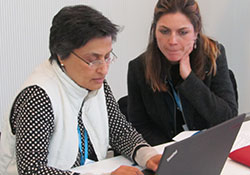Training course on mentoring skills for consultants in antimicrobial resistance

WHO
On 23–25 February 2016, WHO/Europe, in collaboration with the Royal Tropical Institute (KIT) in Amsterdam, the Netherlands, conducted a three-day course, which trained consultants working with laboratories on antimicrobial resistance to integrate the implementation of quality management systems into their visits, and to provide remote support to laboratories between visits.
This interactive course provided updated knowledge on use of the Laboratory Quality Stepwise Implementation (LQSI) tool and covered training on communication skills, which were practiced through role plays and group work.
Even though the use of the LQSI tool minimizes the need for external assistance in the implementation process, regular mentoring remains crucial. During these visits, mentors can:
- answer questions
- give practical recommendations
- help to develop action plans to overcome obstacles
- perform external audits
- provide training.
Dr Nandini Shetty, Consultant Microbiologist, Reference Microbiology Laboratories at Public Health England (United Kingdom), said, "I have worked as a consultant with WHO since 2014. I strongly believe that a reliable and quality-assured laboratory is the key to limiting the emergence and spread of antimicrobial resistance. The implementation of quality management systems during missions is complex and requires application of knowledge, understanding, advocacy, negotiation and diplomacy, sometimes in challenging environments."
She added, "The mentoring skills course gave me valuable insight into the practical skills that I would need in different environments to support colleagues in the implementation of quality systems in national reference microbiology laboratories. The course was delivered in a systematic and pragmatic manner with exposure to real life scenarios, and this has equipped me with the skills I would need to support laboratory staff in a step-by-step manner, leading eventually to ISO 15189 accreditation."
The first meeting that integrates mentoring for quality management systems will take place in Armenia at the end of March 2016.
Background
Well-functioning, sustainable laboratory services, operating according to international principles of quality and safety, are essential for strong health systems and crucial for improving public health.
A key method for effective and efficient strengthening of medical laboratories is the implementation of a quality management system based on the International Organization for Standardization (ISO) standard 15189:2012. In 2014, WHO launched a web-based tool that guides laboratories with the practical implementation of quality management systems: the LQSI tool.



